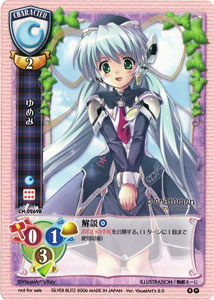Key (company) facts for kids
 |
|
| Brand of Visual Arts | |
| Industry | Computer games |
| Genre |
|
| Founded | July 21, 1998 in Osaka, Japan |
| Founders |
|
| Headquarters |
Kita, Osaka
,
Japan
|
|
Area served
|
Japan |
|
Key people
|
|
| Products |
|
Key is a Japanese studio that creates visual novels. These are story-based games where players make choices that affect the plot. Key is famous for making games with deep stories and emotional plots. The studio was started on July 21, 1998, as a part of the company Visual Arts. Key's office is located in Kita, Osaka, Japan.
Key's first visual novel was Kanon, released in 1999. It featured a detailed story, modern anime-style art, and music that set the mood. Their second game, Air (2000), also had a complex story and more detailed gameplay. While Kanon and Air were originally made for older players, Key's third game, Clannad (2004), was released for all ages.
Key has created 18 visual novels so far, with Stella of The End (2022) being one of their latest. They have worked with other companies like Interchannel and Prototype to release their games on different consoles. Key has also teamed up with P.A. Works and Aniplex to create three original anime TV series. These include Angel Beats! (2010), Charlotte (2015), and The Day I Became a God (2020). A crossover anime series called Kaginado started in 2021. The Prima Doll project includes an anime series from 2022 and a four-volume visual novel series.
Co-founder Jun Maeda is a very important person at Key. He has helped with planning, writing stories, and composing music for most of Key's visual novels. Na-Ga, Key's main artist, first worked on backgrounds. But with Key's sixth game, Little Busters! (2007), he became a co-art director. Shinji Orito, another co-founder and Key's main composer, has created music for most of Key's games.
Key has been a regular participant at the Comiket convention since 1999. They sold Kanon-related items at their first Comiket. Key's most recent appearance at Comiket was in 2021. In 2001, Visual Arts started a record label called Key Sounds Label. This label releases music albums and singles related to Key's visual novels. Between 2007 and 2010, Key also had an Internet radio show called Key Net Radio.
Contents
The Story of Key: How It Started
Before Key was formed, its founding members worked for another visual novel company called Nexton. They were part of a brand called Tactics. Four of Key's original staff worked on Tactics' first game, Dōsei. These included Itaru Hinoue as art director and Shinji Orito as a music composer.
After Dōsei, other future Key members joined Tactics. These were Naoki Hisaya, Jun Maeda, and OdiakeS. They helped create two more games: Moon (1997) and One: Kagayaku Kisetsu e (1998). However, the staff at Tactics had different ideas from Nexton about how to make their next game. Because of this, most of the Tactics team left Nexton. They wanted to work for a company where they could have more creative freedom.
Itaru Hinoue, who had worked at Visual Arts before, introduced Key's founding members to Takahiro Baba, the president of Visual Arts. Baba gave the developers the freedom they wanted. So, on July 21, 1998, they officially joined Visual Arts and formed Key.
When they started making Kanon, they hadn't chosen a name for their new brand yet. The first idea was "Azurite." But Jun Maeda didn't like it. He wanted a name that truly showed what the brand was about. Maeda saw the name "Key" on a music store sign he passed every day and loved it. The team decided on the name "Key" by voting.
Key released Kanon on June 4, 1999. It focused on character stories, visuals, and music. A year later, on September 8, 2000, Key released their second game, Air. It had a similar storytelling style to Kanon.
Key's Games: A Timeline
Key's third game, Clannad, was similar to their earlier games but was made for all ages. It was supposed to come out in 2002 but was delayed. Clannad was finally released on April 28, 2004. Seven months later, Key released their shortest game, Planetarian: The Reverie of a Little Planet, on November 29, 2004. This game was also for all ages.
Planetarian is a special kind of visual novel called a kinetic novel. This means players don't make choices during the game; they just enjoy the story. Key's fifth game was Tomoyo After: It's a Wonderful Life, released on November 25, 2005. This game was a spin-off of Clannad and focused on the character Tomoyo Sakagami.
Key released their sixth game, Little Busters!, on July 27, 2007, for all ages. They later released another version, Little Busters! Ecstasy, on July 25, 2008, which added more story and visuals.
To celebrate Key's ten-year anniversary, Key and Visual Arts held a two-day event in 2009. Key also worked with P.A. Works and Aniplex to create the anime series Angel Beats!, which aired in 2010. Key's eighth game, Kud Wafter, was released on June 25, 2010. It was a spin-off of Little Busters! and focused on the character Kudryavka Noumi.
Key released their ninth game, Rewrite, on June 24, 2011, for all ages. A fan disc for Rewrite called Rewrite Harvest festa! was released on July 27, 2012. For Key's 15-year anniversary, a visual novel version of Angel Beats! 1st Beat was released on June 26, 2015. Key again worked with P.A. Works and Aniplex for the anime series Charlotte, which aired in 2015.
Key released the kinetic novel Harmonia on September 23, 2016. It was first available in English before its Japanese release. Key released the visual novel Summer Pockets on June 29, 2018. An expanded version, Summer Pockets Reflection Blue, was released on June 26, 2020. Key collaborated a third time with P.A. Works and Aniplex for the anime series The Day I Became a God, which aired in 2020.
In October 2020, Key announced three new kinetic novels: Loopers, Lunaria: Virtualized Moonchild, and Stella of The End. Loopers was released on May 28, 2021. Lunaria: Virtualized Moonchild was released on December 24, 2021. Stella of The End was released on September 30, 2022. Key also announced the Prima Doll project in October 2020. This project includes a 12-episode anime TV series that aired in 2022.
Key released the Planterian Ultimate Edition on September 3, 2021. This edition included Planetarian: Snow Globe, a kinetic novel version of an earlier short story. Key worked with Wright Flyer Studios to create the mobile role-playing game Heaven Burns Red. It was released on February 10, 2022, for iOS and Android devices. A four-volume kinetic novel series for Prima Doll began with volume one on April 28, 2023. Key announced a new visual novel called Anemoi on November 15, 2023. A new kinetic novel titled Kōsai Toshi: Augment Protocol was announced on December 15, 2023.
| 1999 | Kanon |
|---|---|
| 2000 | Air |
| 2001 | |
| 2002 | |
| 2003 | |
| 2004 | Clannad |
| Planetarian: The Reverie of a Little Planet | |
| 2005 | Tomoyo After: It's a Wonderful Life |
| 2006 | |
| 2007 | Little Busters! |
| 2008 | Little Busters! Ecstasy |
| 2009 | |
| 2010 | Kud Wafter |
| 2011 | Rewrite |
| 2012 | Rewrite Harvest festa! |
| 2013 | |
| 2014 | |
| 2015 | Angel Beats! 1st Beat |
| 2016 | Harmonia |
| 2017 | |
| 2018 | Summer Pockets |
| 2019 | |
| 2020 | Summer Pockets Reflection Blue |
| 2021 | Loopers |
| Planetarian: Snow Globe | |
| Lunaria: Virtualized Moonchild | |
| 2022 | Stella of The End |
| 2023 | Prima Doll: Fuyuzora Hanabi / Sekka Monyō |
| 2024 | Prima Doll: Mumei Tenrei |
| Kōsai Toshi: Augment Protocol |
Key's Creative Team
Key's main staff members are part of the studio and Visual Arts. Jun Maeda, one of Key's founders, has worked on planning projects and was a main story writer. He has also composed music for most of Key's games. Maeda stepped down as the main story writer after Little Busters! Ecstasy. However, he still works on music for Key's games. He also designed the Angel Beats! 1st Beat visual novel and helped write its story. Maeda also came up with the original idea for Summer Pockets.
Na-Ga, Key's main artist, mostly worked on background art in earlier games. He became a co-art director with former Key artist Itaru Hinoue for Little Busters!. Other graphic artists like Shinory and Mochisuke have also contributed to Key's games. Shinji Orito, another founder and Key's main composer, has created music for most of Key's games.
Key's Influence on Visual Novels
Key has had a big impact on the world of visual novels. This influence started even before Key was formed, when most of its founding members worked for Tactics. Inspired by another visual novel called To Heart (1997), the developers at Tactics created a simple game style. This style involved a funny beginning, a heartwarming romance, a sad separation, and then an emotional reunion. This type of game is known as a "crying game" or "nakige." The main goal is to make players feel deeply for the characters and cry during emotional parts. This leaves a lasting impression on the player. Tactics' game One: Kagayaku Kisetsu e was made using this formula.
After One was finished, the development team left Tactics to form Key. They used this same formula for their first game, Kanon. Kanon was highly anticipated and created a big stir in the industry. Two years later, Air caused even more excitement. The success of One and Kanon led other visual novel companies to adopt Key's "crying game" formula. Some examples include Kana: Little Sister, the Memories Off series, D.C.: Da Capo, Snow, and Wind: A Breath of Heart.
Ryukishi07 of 07th Expansion wrote in 2004 about how Key's works influenced him. He was planning his game Higurashi no Naku Koro ni. Ryukishi07 studied Key's games to understand why they were so popular. He realized the secret was how the stories would start with happy, normal days. Then, something sudden would happen, making the player cry from the shock. He used a similar idea for Higurashi. However, instead of making players cry, Ryukishi07 wanted to scare them by adding horror elements. Ryukishi07 wanted to be connected to Key, which he called a "masterpiece maker."
Key is one of 17 brands under Visual Arts whose games are featured in the Lycèe Trading Card Game. Characters from Key's first five games were included in early card sets. Characters from Little Busters! through Rewrite were in later sets. There are also many rare promotional cards with Key characters. Other well-known visual novel companies in the card game include AliceSoft, August, Leaf, Navel, and Type-Moon.
Images for kids
See also
 In Spanish: Key para niños
In Spanish: Key para niños
 | Leon Lynch |
 | Milton P. Webster |
 | Ferdinand Smith |



